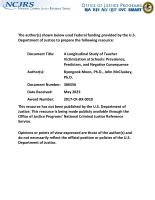Procedural justice
What Works to Reduce Violent Gun Crime in Focused Deterrence Initiatives? Estimating the Effect of Services and Enforcement in Facilitating Desistence Among Prolific Violent Offenders
Testing the Efficacy of Judicial Monitoring: A Randomized Trial at the Rochester
Citizens' Reactions to Hot Spots Policing: Impacts on Perceptions of Crime, Disorder, Safety, and Police
A Longitudinal Study of Teacher Victimization at Schools: Prevalence, Predictors, and Negative Consequence
Procedural justice, neighbourhood context, and domestic violence reporting intention among subgroups of immigrants
Immigrant status and neighborhood context on perceptions of police procedural justice
The Overlooked Role of Jails in the Discussion of Legitimacy: Implications for Trust and Procedural Justice
Measuring, managing, and enhancing procedural justice in policing: Promise and pitfalls
Police Activities and Community Views of Police in Crime Hot Spots
Desistance from Crime: Interventions to Help Promote Desistance and Reduce Recidivism
No single criminal justice agency can promote desistance on its own. Partnerships across state, local, and federal agencies — along with the support of family and community stakeholders — are instrumental in supporting desistance from crime and reducing recidivism.
Law enforcement, courts, corrections, and community supervision agencies play a key role in the desistance process and reducing recidivism.
See the YouTube Terms of Service and Google Privacy Policy
Client Perspectives of Holistic Defense: Strengthening Procedural Justice through Enhanced Client Trust
What works to reduce violent gun crime in focused deterrence initiatives? Estimating the effect of services and enforcement in facilitating desistence among prolific violent offenders in Tampa
A Multi-Site Randomized Controlled Trial of an Enhanced Field Training Officer Program: An Analysis of Administrative Outcomes and Community Interactions
Statewide Law Enforcement Crime Research, Evaluation, and Analysis
What Constitutes Success? Evaluating Legal Services for Victims of Crime, A Formative Evaluation, Webinar, 2021
Crime and Justice: A Review of Research, Volume 30
Papers From the Harvard Executive Session on Policing and Public Safety (2008-2015)
Policing In Central and Eastern Europe: Dilemmas of Contemporary Criminal Justice
The short-term and long-term impacts of the procedural justice training
Improving investigations and community relations through the training of evidence-based interviewing skills in frontline officers
Enhancing Procedural Justness of Encounters Through Substantiation (EPJETS): The Atlantic County Randomized Controlled Trial.
Fatal and Non-Fatal Intimate Partner and Family Violence Against Older Women: An Exploration of Age and Police Response to Inform Research, Policy and Practice
Building Trust Inside and Out The Challenge of Legitimacy Facing Police Leaders
In the face of budget cuts, changing workforce demands, new varieties of crime and new technologies, how should police executives manage officers and other personnel and still ensure that organizational goals are being met?
Drawing on new data from a national sample, Dr. Dennis Rosenbaum, Director of the Center for Research in Law and Justice at the University of Illinois, Chicago, discussed the latest findings...




